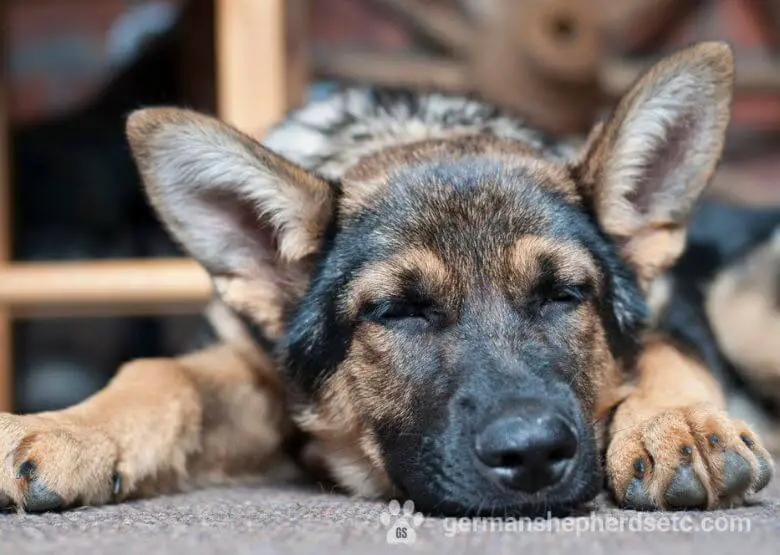Table of Contents
When your German Shepherd is a young puppy, it needs a lot of sleep to get enough energy for physical and mental growth. When it is awake, it will be more active, exploring new things and experiencing new sensations after a good, comfortable, and secure sleep.
The time of German Shepherd sleep routines varies depending on the age. When it is a puppy, it needs 15-20 hours, but as an adult, your doggy may sleep for 10-12 hours per day and feel great.
Since sleep is an integral part of the German Shepherd’s well-being and development, it contributes greatly to the health of its nervous, brain, immune, and muscles. The Shepherd deprived of good sleep can develop behavioral disorders and get sick easier.
So, let’s speak about your doggy’s sleeping needs, habits, and tips on how to improve it in more detail.
What Do You Need to Consider About Your Young German Shepherd Puppy Sleeping?
The most commonly asked questions about the German Shepherd puppy sleep schedule relate to its early age. Your puppy needs about 18 hours of sleep per day, and some young doggies may even need a bit more. So, 15-20 hours per 24-hour period is considered a norm.
As your furry friend gets older, the sleeping time reduces. Your 4-month-old puppy may even sleep 11 hours per day and feel perfect. Meanwhile, adult dogs sleep for 10-12 hours per 24-hour period.
You need to keep in mind that your pup will not sleep the whole night before its 6-month mark soundly. The reasons are missing the littermates and mother and feeling insecure surrounded by new smells and noises. However, the most important reason is the small size of its bladder that does not allow it to retain from potty for such a long time. So, it may start whining and crying if it wants to go potty. The latter issue is vital for potty training – you need to go out to potty 2-3 times per night before your doggy reaches 4-6 months old to avoid accidents. You may even need to wake up your puppy at night to do without unexpected occasions.
Your little pup may also start crying at night for other reasons, for example, if it is scared or feels lonely or hungry. You can try to help it sleep better in several ways.
First of all, ensure that your pet is tired enough before going to bed. Take it out for 5 minutes to walk during its first month and add the next 5 minutes for every month of its life. For example, your 4-month-old puppy can walk for 20 minutes. Another method of improving your doggy’s sleep at night is taking it potty before bed.
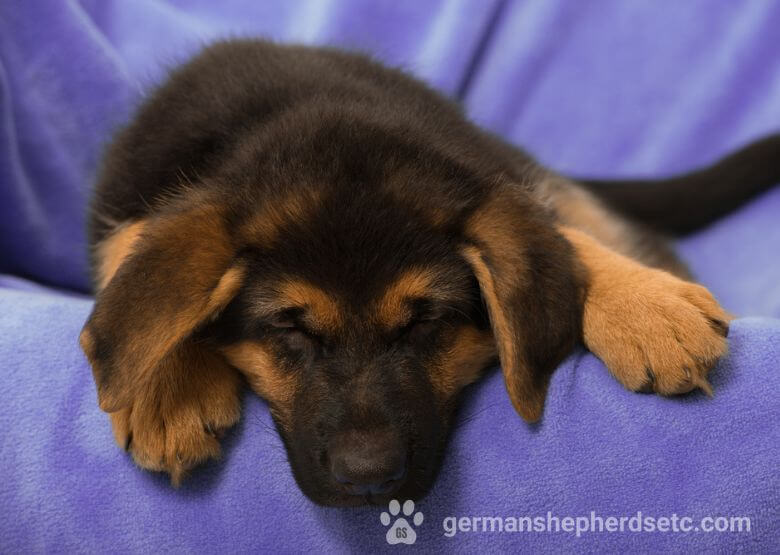
If your puppy is very young, let it sleep in your room when you first get it home. Put the crate beside your bed to comfort it easily during the night. You also need to offer your new pet familiar objects, for example, clothes or toys with the scent of its previous home. Arrange a comfortable sleeping place equipped with blankets, stuffed toys, and snacks. You may even play soothing music during bedtime, eliminating anxiety and preventing whining. Classical music is a good choice for this purpose.
Comfortable bedding is essential. The space should not be large because they may attempt to do their business right where they are sleeping if they find a vacant spot. You can place your puppy’s crate next to your bed to let it smell you to get a sense of security. However, move the crate out of your bed when it gets older. Do it gradually, moving it farther and farther every night. Then, the time will come to take it away from your bedroom, and your puppy will feel comfortable with it.
Do Shepherds’ Sleep Routines Differ from Those of Humans?
The difference between human and dog sleep cycles is dramatic. They are much shorter in dogs. To compare, a human sleep cycle lasts 70-120 minutes, while a German Shepherd’s cycle lasts only 45 minutes. Dogs have only two REM cycles at a time. They last 6 minutes. The length of them for humans may change during the night, and we may spend about 25% of our sleeping time in REM, changing these cycles for non-REM ones a few times.
Dogs are polyphasic sleepers because they can also go to bed in the daytime. People are monophasic, sleeping 7-9 hours at night. That is why while people spend their daytime working and alert, dogs need about 5 hours of rest per day. They do not necessarily sleep fast during this time. It can be just relaxed drowsiness, and this state is very important for your doggy’s well-being, health, and happiness.
There has been a discussion on whether dogs can dream. Yes, dreaming can occur during the REM phase. Puppies may dream even more than adult dogs because they sleep more and their nervous system is not stable at all. So, they may dream about their daily activities, food, playing with you, and other things that are processed in their brain. When you notice that your pup moves its limbs as if running or murmurs something while sleeping, it is evidence of its dreaming.
The Most Common Positions of a Sleepy German Shepherd
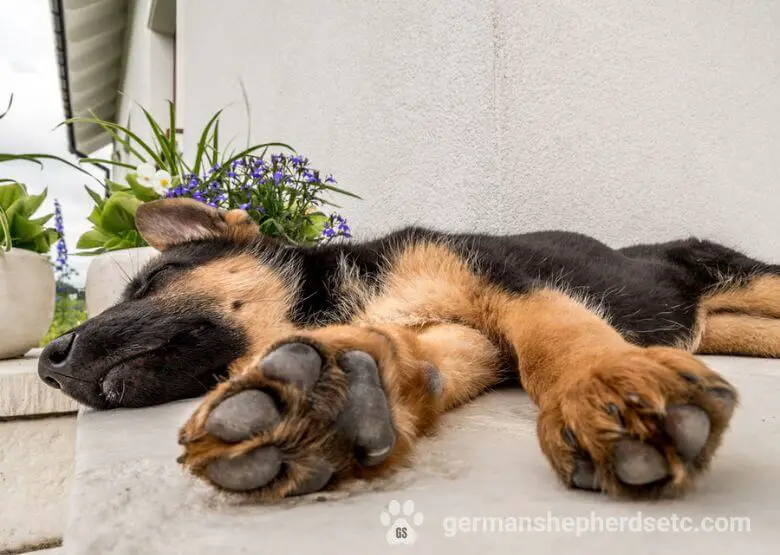
You may find your German Shepherd sleeping in different positions, even the most uncommon. What do they mean? Your German Shepherd’s sleeping habits depend on many factors, but the most important of them is comfort. The most widely observed position is sleeping on the back. The reasons for this position are the following:
- Your pet feels entirely comfortable. This position provides complete relaxation.
- The pup feels safe and protected. Your dog trusts you if it exposes its vulnerable stomach to the outer world. It does not expect attacks from any enemies or predators. That is why canines rarely sleep on their backs in the wild.
- Your doggy wants to express submission. It does not mean challenging your authority or confronting other animals in the house.
- The German Shepherd may just want to feel colder. Its thick plush coat, especially if it is long-haired, does not allow it to cool down easily, so it lays on its back to let the air circulate around its body, over the belly, and paws. In this case, you may notice your dog lying on its back on the cold tile or even near the open window.
German Shepherds also sleep in many other positions. The most popular of them include the following:
- Close to their owner. It is pretty pleasing when your doggy sleeps by your bed or is somehow close to you. Shepherds like to feel a part of a pack, so if they sleep like that, they feel more secure.
- Tightly curled up. This position allows a German Shepherd to maintain the heat efficiently. These dogs usually sleep like that in cold weather or if they feel something threatening to protect their neck and stomach against unexpected attacks.
- With the tail on their nose. A German Shepherd has a very sensitive nose, and it wants to protect it from rain, snow, or wind. It happens when your dog sleeps outdoors, especially in winter.
- On the side. This position allows the doggy to extend its muscles and joint as much as possible. It also means that the Shepherd feels comfortable and confident in this environment and does not expect any enemies or unwanted encounters. This position can also be observed if they sleep next to another animal – a cat or a dog – they consider their friends.
- On the belly. If your doggy feels comfortable, this position is uncommon. Moreover, it is neither comfortable nor relaxing. However, it can easily and quickly stand up and jump or run from it if it is needed.
You may also notice some other uncommon positions for your dog’s sleeping. They mostly depend on their personality.
Sleeping with a German Shepherd: Is It Good or Bad?
The question of sleeping with your German Shepherd puppy is essential for many dog owners. The common advice is not to do that during the first months of your pup in your home. Instead, you can put its dog bed or crate next to your bed to soothe it quickly if it feels uncomfortable or scared. Moreover, your young doggy may have accidents at night, and you need to potty train it first.
However, when your dog is an adult, you can do it, and it will bring a lot of positive moments to both of you. When your doggy is well-behaved and trained properly, you may get a lot of benefits from sleeping with it. They are the following:
- you will increase your comfort and security;
- your overall health condition can improve;
- the risk of sudden death will decrease;
- the cholesterol and triglyceride levels will go down;
- the blood pressure will become lower;
- this kind of sleeping can promote creativity;
- it will regulate your heartbeat rates;
- your memory will improve;
- you will wake up in a great mood due to the flow of oxytocin;
- you will feel absolutely protected and safe;
- the furry and cuddly friend will make you feel cozy and comfortable;
- the immunity will boost.
Of course, close and continuous contact with animals can provoke allergic reactions. However, recent research shows that children who sleep with their pets are less likely to develop any allergies when they grow up.
How Long Should a German Shepherd Sleep?
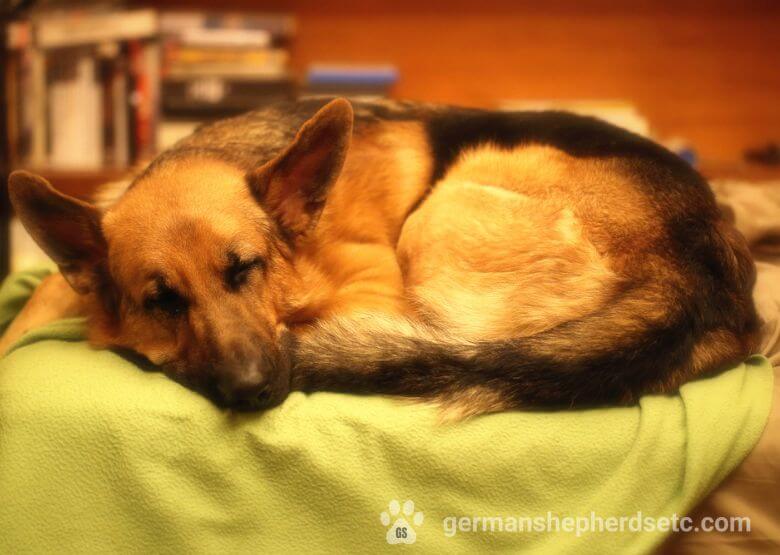
Many dog owners are often worried about their German Shepherd’s sleeping time. You may wonder why your doggy sleeps so much or has just changed its sleeping habits dramatically.
Generally, an adult German Shepherd sleeps 10-12 hours per day, but puppies and senior dogs sleep longer, which is normal. You can consider different causes if your pup sleeps too much and decide what you can do after talking to your vet.
- It’s natural. Your doggy needs this time to develop or restore its brain, central nervous system, immune system, and muscles. It uses so much energy during the day that it needs to compensate for it while sleeping. However, if your grown-up German Shepherd sleeps more than 14 hours and is apathetic all the other time, you may start to be concerned and take your pup to the vet.
- Excess heat. German Shepherds are bred to feel comfortable in colder environments. That is why they have double-layered coats. When the weather is very hot, they become sleepy to cool down. If your pup started sleeping more when it got hotter, you don’t need to worry. Just give it access to shade and cool areas and provide it with good amounts of water during the day. Never let it stay in direct sunlight.
- Your pup does not feel well. If your German Shepherd started sleeping more for no reason, it might be a sign of some health issues. So, you need to have it checked by the vet immediately.
- Your doggy is bored. German Shepherds are working dogs with a lot of energy and drive. You should exercise your pet a lot. At least one hour of intense exercise per day is vital. However, be careful not to overexercise your pup when it is little. Add 5 minutes of walking and training per every month of its age, or you can damage its bones and joints.
- Pick out an appropriate diet. Poor diet may be a cause of extensive sleeping. Talk to your vet to choose the diet your Shepherd needs, or opt for one meant specifically for German Shepherds.
- Age is a crucial factor. You know now that little puppies need a lot of sleep, and it is normal when your fluffy cub sleeps 15-20 hours per day. The same is applicable to senior dogs. Older animals need more sleep to restore their muscles and brain activity. Moreover, they get tired easily and need a lot of rest.
To make your pup sleep according to its age and environment, you may need to make some changes and deal with different factors. If it suddenly started sleeping more, but its behavior didn’t change, and it is lively and playful, everything is OK, and you do not need to worry. You may think about what has changed in your environment because longer sleep may be your doggy’s response to that change. Consider the weather conditions too. If your pup sleeps more when it is cold or hot outside, it is also a normal reaction to temperature changes. If it gets to sleep immediately after feeding, you may need to adjust the diet a bit.
You may also check whether your doggy’s bedding is comfortable enough for good and sound sleep. If not, make some changes. Always check whether it has constant access to fresh water. Underhydration can be one of the reasons for a long sleep.
Of course, when you notice abrupt changes, you must take your pet to the veterinarian. Long sleeping time may be the first sign of some unpleasant health disorders.
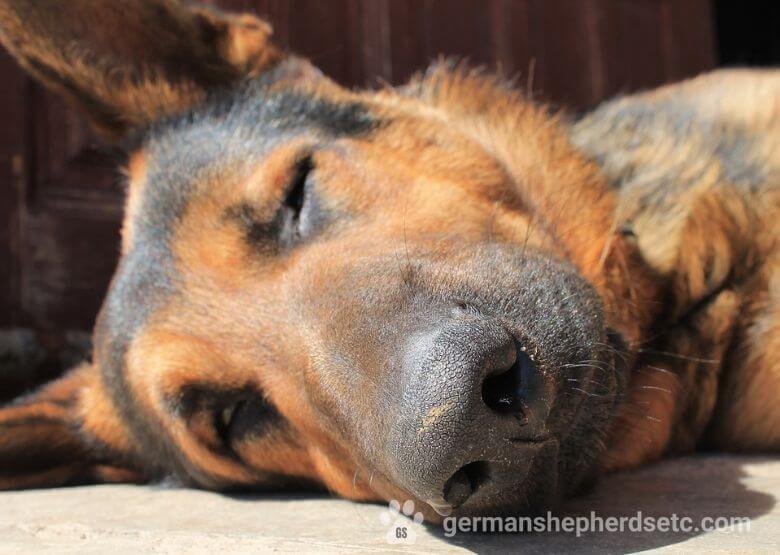
FAQ
Why does my German Shepherd sleep so much?
Little puppies can sleep 18-20 hours per day, while adult dogs usually need 14-15 hours of sleep round-the-clock. If your German Shepherd starts sleeping too much, it may be a sign of a minor illness. Such conditions as diabetes, arthritis, Lyme disease, and hypothyroidism also require a lot of sleep because your pup’s body needs to recover. The excess sleeping may also be a result of heat, boredom, or a poor diet. Older German Shepherds can also start sleeping a lot. Sometimes, the sleep duration can be individual, and you don’t need to worry.
Why does my German Shepherd sleep on its back?
When your dog sleeps on its back, it always looks cute. The reasons for it can be different, but the main one is that it feels comfortable and absolutely trusts you. It can also show submission in this way, or it is too hot, and your doggy wants to cool down.
Why is my German Shepherd breathing so fast while sleeping?
Breathing faster means that your doggy is in its REM phase of sleep, which is accompanied by a high amount of brain activity. So, your pup needs more energy and starts breathing faster to get an additional amount of oxygen for the brain. Breathing fast helps it transfer this oxygen from the lungs to the bloodstream, converting it into energy.
How many hours does a German Shepherd sleep?
The number of hours your German Shepherd pup can sleep is pretty individual. There are no strict standards. However, the amount of sleep always depends on your dog’s age and health condition. Little puppies sleep 15-20 hours daily, while adult dogs reduce this number to 12-14. Senior dogs can sleep more – 14-20 hours is normal. Ill doggies can sleep most time because sleeping helps them recover.
Final Thoughts
Remember that comfortable and safe German Shepherd sleeping is key to its healthy and happy life. Consider 15 hours of sleep per day as a norm and follow the overall rules and tips to make your pup’s sleep more comfortable and restoring.
You should also observe your doggy’s sleeping positions and try to eliminate the factors that prevent your pet from healthy sleeping. All sleeping habits are pretty individual. However, if you notice something unusual, you’d better talk to your veterinarian. If your German Shepherd sleeps well, you will enjoy long years together.
